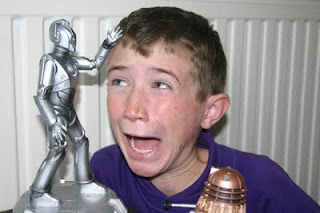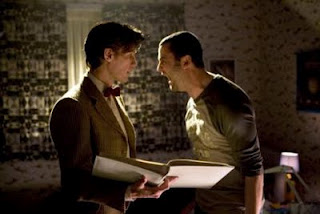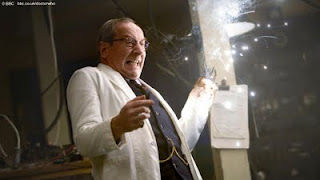Scary for scary’s sake? Reviewer James Willetts asks whether last Saturday’s episode had more to it that meets the (glass) eye…
There’s a lot of talk a lot of the time about how scary new-Who can be. How it’s somehow unsuitable for children, as though terrifying them about a fictional monster is in some way going to emotionally cripple them for life. It’s an argument that most people, thankfully, have little time for, and I bring it up because ‘Night Terrors’, an episode which was seemingly designed simply to scare the crap out of small children everywhere, actually addresses it. It’s a nicely meta moment that sums up everything else within this episode; a child’s father mentions that, to stop him being scared, they banned scary television.
It’s probably a common response. If you read the message boards and speak to parents they often worry that Doctor Who may be unsuitable for their child. As though mild peril with a through-flowing message that everything will be alright in the end is a bad thing.
Within the context of the episode it’s fairly clear what Mark Gatiss thinks of this idea. After all, when you reveal the source of your Midwich Cuckoo’s phobias to be amplified fears of rejection and abandonment picked up from his concerned parents, you’ve pretty much set out your stall on over-protective mollycoddling. It’s a neat idea, a Larkin-esque process of inter-generational panic that feeds into pre-existing and deep seated fears of inadequacy.
This is an episode that is rich in deeper meaning, and even if the plotting doesn’t always live up to the themes within, it is at least beautifully shot. This may be one of the best directed episodes of new-Who in years, and the opening five minutes in particular are especially good. Much like ‘The Doctor’s Wife’, which Richard Clark also directed, this is an episode which does a lot with very little.
One of those budget saving episodes which pop up every season to cut down on the CGI costs of populating entire space-sectors with alien life, this is less big-budget space opera and more character driven psychological drama. It’s an Eastenders episode re-imagined by Guillermo Del Toro, with all of the rich visual cues that implies.
The use of light and shadow, the thin slivers of action, the visual tricks designed to suggest something otherworldly about a normal block of flats – all were expertly done*. Considering that the majority of the action took place in a near empty ‘Dolls’ House’ and an ordinary flat, a sense of real scope was present. One of the reasons why this and ‘Blink’ are so potentially scary is that they use real world elements which all children will encounter. They are more grounded than an invasion of soulless cyborgs from an alternate reality.
I think the episode starts to go downhill when it reveals that George is not a haunted child but an alien. It’s far harder to relate to a being which is unconsciously driving events rather than experiencing them as the audience does. Even if George doesn’t know he’s a Tesla, we do. Suddenly, this is no longer an imperilled child but a psychic cuckoo. Of course, it may have stepped too close to memories of ‘Fear Her’**.
Actually the twist that George wasn’t human was a big surprise, and the idea that he was responsible for the problems, and that the monsters were confined to the pocket reality he had created in his cupboard, was a neat one.
Although it set up a neat conflict between the peg doll people and the humans trapped in the closet, this was yet another chance for the Doctor to solve a problem by talking. Convincing George to face his fears was good, but it was in Alex’s acceptance of his son that the true highlight of the episode came along. His ‘Whatever you are …’ lines, whilst a little bit cheesy, were a real treat and, in an episode that was more about building mood than anything else, it was a solid character beat.
It was nice to see that character work, especially as the ending – where the ‘power of love’ actually succeeds in solving all our problems – is one Gatiss had tried before to less impressive effect. The similarities between this and ‘Victory of the Daleks’ is a little uncanny in terms of that final story beat; unwitting simulacrum of humanity saves those around him by recognising the love they all feel for one another. I don’t know if this can be considered a trope yet, but it’s heading that way. It’s a far better episode than that wartime mess however and the reduction in scale and CGI seems to help.
Star of the show stands at a close tie between the three main cast members, with Rory edging it this week. His world weary reaction to the situations that he and Amy and being thrown into is lovely and serves as a nice contrast to the near universal enthusiasm of Amy and the Doctor. This is certainly not the same Rory we saw in ‘Vampires in Venice’, but it’s one who has grown and matured and is better for it. Too little is being said as to what good companions these two are, and as much as I loved Donna this is a golden pairing harking back to the days of Rose. (The less said about Martha, the better).
This may not have been the flashiest outing of Doctor Who, no planets or history as Amy puts it, but sometimes a nice little scary bedtime story is what you want. And when it looks this good, it’s hard not to be happy.
*There’s been criticism of the ‘darkness’ of Doctor Who. Not the metaphorical ‘darkness’, but the fact that everything is very poorly lit. I love that kind of stuff though. Totally coincidentally I came across this today. There’s an artistic tendency for Chiaroscuro in comics which works terribly well for urban vigilante/ horror stories. The thing about Batman, or Black Panther, or Hellboy is that they are trying to cause fear. That’s their weapon. I don’t mind Doctor Who being dark when it has a purpose, because the show runners are fairly obviously keen to use fear as a tool too. This is a story that benefits from themes of the dark (fear, abandonment, night terrors), even if the night doesn’t work in terms of story (why is the old woman shopping and taking her bins out at night anyway? And just what hours does George’s mother work?)
**LOL! Jokes! No one remembers ‘Fear Her’.





